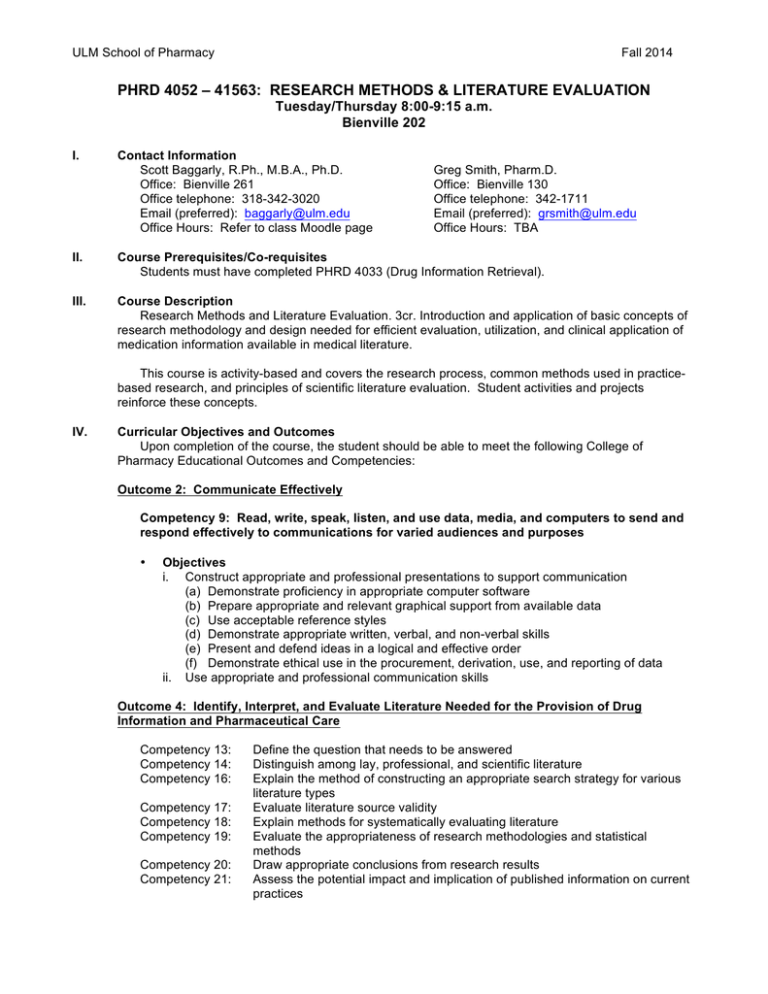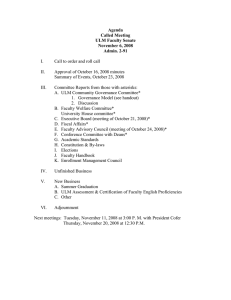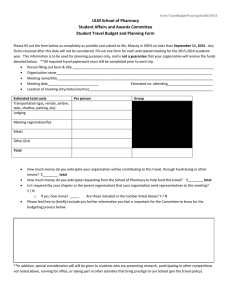
ULM School of Pharmacy
Fall 2014
PHRD 4052 – 41563: RESEARCH METHODS & LITERATURE EVALUATION
Tuesday/Thursday 8:00-9:15 a.m.
Bienville 202
I.
Contact Information
Scott Baggarly, R.Ph., M.B.A., Ph.D.
Office: Bienville 261
Office telephone: 318-342-3020
Email (preferred): baggarly@ulm.edu
Office Hours: Refer to class Moodle page
Greg Smith, Pharm.D.
Office: Bienville 130
Office telephone: 342-1711
Email (preferred): grsmith@ulm.edu
Office Hours: TBA
II.
Course Prerequisites/Co-requisites
Students must have completed PHRD 4033 (Drug Information Retrieval).
III.
Course Description
Research Methods and Literature Evaluation. 3cr. Introduction and application of basic concepts of
research methodology and design needed for efficient evaluation, utilization, and clinical application of
medication information available in medical literature.
This course is activity-based and covers the research process, common methods used in practicebased research, and principles of scientific literature evaluation. Student activities and projects
reinforce these concepts.
IV.
Curricular Objectives and Outcomes
Upon completion of the course, the student should be able to meet the following College of
Pharmacy Educational Outcomes and Competencies:
Outcome 2: Communicate Effectively
Competency 9: Read, write, speak, listen, and use data, media, and computers to send and
respond effectively to communications for varied audiences and purposes
•
Objectives
i. Construct appropriate and professional presentations to support communication
(a) Demonstrate proficiency in appropriate computer software
(b) Prepare appropriate and relevant graphical support from available data
(c) Use acceptable reference styles
(d) Demonstrate appropriate written, verbal, and non-verbal skills
(e) Present and defend ideas in a logical and effective order
(f) Demonstrate ethical use in the procurement, derivation, use, and reporting of data
ii. Use appropriate and professional communication skills
Outcome 4: Identify, Interpret, and Evaluate Literature Needed for the Provision of Drug
Information and Pharmaceutical Care
Competency 13:
Competency 14:
Competency 16:
Competency 17:
Competency 18:
Competency 19:
Competency 20:
Competency 21:
Define the question that needs to be answered
Distinguish among lay, professional, and scientific literature
Explain the method of constructing an appropriate search strategy for various
literature types
Evaluate literature source validity
Explain methods for systematically evaluating literature
Evaluate the appropriateness of research methodologies and statistical
methods
Draw appropriate conclusions from research results
Assess the potential impact and implication of published information on current
practices
ULM School of Pharmacy
PHRD 4052/Fall 2014
Outcome 6: Think Critically
Competency 24: Identify, retrieve, understand, analyze, synthesize, and evaluate
information needed to make informed, rational, and ethical decisions
•
V.
Objectives
i. Systematically gather, organize, and extract relevant information using a variety of methods
and research tools
ii. Analyze information within appropriate scientific, social, and clinical contexts
(a) Identify principles of organization and the logic of arguments
(b) Identify and test assumptions, biases, and prejudices implicit in arguments
(c) Employ appropriate mathematical and statistical tools and electronic technology to
analyze information
(d) Assess accuracy, soundness, fairness, significance, relevance, completeness, and
persuasiveness of information, arguments, and sources
iii. Synthesize information in order to draw conclusions, hypothesize, conjecture alternatives,
or plan a course of action
iv. Evaluate conclusions and solutions according to appropriate criteria, and revise as
necessary
v. Provide support for rationale, solutions, and results
Course Specific Objectives and Outcomes
Students who successfully complete the course requirements should achieve the following course
objectives and outcomes:
•
•
•
•
•
•
•
•
Interact productively in team-based activities
Demonstrate proficiency in applicable computer software
Perform literature reviews
Design a practice-based research project
Select appropriate statistical methods for hypothesis testing
Analyze relevant scientific literature and clinical drug trials with respect to research
methods, research designs, and statistical analyses
Prepare properly formatted written research reports according to assigned criteria
Present timed presentations using appropriate PowerPoint slides
VI.
Course Topics
Topics covered this semester will include the research process, research concepts, types of
measurement, data management and manipulation, literature reviews, statistical methods, common
research designs, data collection methods, and evaluation and analysis of scientific literature. A
detailed schedule of topics is included in the course schedule below.
VII.
Instructional Methods and Activities
The course will include, but may not be limited to, lecture material using PowerPoint slides, class
discussions moderated by the instructor, homework and reading assignments, group assignments, a
group research design project including a written report, and a PowerPoint presentation of a clinical trial
analysis.
Students are expected to be competent in the use of Microsoft Word (or another word processing
program), Microsoft Excel, Microsoft PowerPoint, and the ULM Moodle and email systems. Lack of
these competencies may place the student at a disadvantage and could adversely impact the scores on
required course activities.
2
ULM School of Pharmacy
VIII.
PHRD 4052/Fall 2014
Evaluation and Grade Assignment
The final grade in the class will consist of the following components and percentages:
Individual Activities
Exam One
Exam Two
Excel Dataset Assignment
Final Exam
Professionalism (see below)
Group Activities
Written Research Project Design
PowerPoint Presentation, Clinical Trial
Group class assignments
Total
Points
100
80
20
100
30
50
50
20
450
Please Note:
The course may include graded assignments. Any such assignments will be added to the
total points available for the semester and averaged as part of the final grade.
The instructor reserves the right to administer unannounced quizzes throughout the
semester. Points from the quizzes will be included as a component of the professionalism grade.
Other components of the professionalism grade include attendance (unexcused absences,
tardiness), group peer evaluation, compliance with policies, late or incomplete assignments, and
class participation (discussion, behavior, inappropriate computer or cell phone use, and
responses to clicker questions). The instructor may include additional items as appropriate
and/or necessary.
GRADING SCALE: A = 90-100%; B = 80-89%; C = 70-79%; D = 60-69%; F = Less than 60
Undergraduate mid-term grades will be posted on-line for students to view via Banner. Midterm grades indicate a student’s status at mid-semester only and do not indicate the final
performance outcome of a student. Students wishing to review their exams with the instructor must
do so within 2 weeks of the test date.
Any student earning a non-passing grade of “D” or “F” on an exam will be required to participate
in mandatory tutoring sessions offered by the course instructor(s) until such a time that they obtain a
passing average in the course.
IX.
Class Policies and Procedures
At a minimum, all policies stated in the current ULM Student Policy Manual & Organizational
Handbook should be followed (see http://www.ulm.edu/studentpolicy/). Additional class policies
include:
A. Textbook(s) and Materials: No textbook is required for the class. Required reading material
may be posted on Moodle. Students will also be expected to use the Internet to search for
information.
3
ULM School of Pharmacy
PHRD 4052/Fall 2014
B. Attendance Policy: Class attendance is mandatory in all pharmacy courses; attendance is
taken in all class sessions. Tardiness and disruptive behavior are not tolerated. Students who are
unable to attend class on time are considered absent for that day.
Absences are unexcused unless a legitimate, validated excuse is presented to the instructor in
accordance with the College of Pharmacy Excused Absence Policy, available in the student policy
manual. Current College of Pharmacy policy states that students reported for accumulating more
than three unexcused absences in a course during an academic semester will be administratively
dropped from the course with a “W” grade, which is counted as an “F” grade with respect to
academic standards.
Any student who is not present for at least 75% of the scheduled class sessions (excused or
unexcused) in any course may receive a grade of “W” if this condition occurs prior to the last day to
drop a course or a grade of “F” after that date. Any University-related activity requiring an absence
from class will count as an absence when determining if a student has attended 75% of class
meetings.
C. Make-up Policy: Each student is expected to submit assigned coursework by the due date and
to attend each examination at the date and time specified. Coursework or examinations missed due
to excused absences will be rescheduled at the discretion of the instructor, and may be in alternate
formats. Any presentations and/or examinations that are not completed by the alternative date will
be scored as a zero. Students who miss the comprehensive final exam during the scheduled time
will receive an “I” for the course in accordance with University and College of Pharmacy policies and
procedures.
D. Academic Integrity: Faculty and students must observe the ULM published policy on Academic
Dishonesty (ULM Student Policy Manual - http://www.ulm.edu/studentpolicy/). All professional
students will adhere to the standards set forth in the College of Pharmacy’s Code of Conduct,
which may be found at: http://rxweb.ulm.edu/pharmacy/policies/copcodeofconduct.pdf
Students are expected to work independently on examinations and assignments unless it is
specifically described by the instructor as a group activity. Academic misconduct includes, but is
not limited to:
• Any use of resources other than your own recollection and reasoning ability on an
examination unless access to the resource is authorized by the instructor in advance.
•
The inappropriate use of electronic or wireless technology (including but not limited to cell
phones, PDA’s, or pagers) during an examination.
•
Possessing or using any examination question previously used in this course.
•
The attempt to reconstruct an examination after it is taken with the intent to share with other
students.
•
Sharing information about an examination with students who have not taken the exam.
Written reports must adequately reference the work of others; plagiarism is considered academic
misconduct. Any student suspected of dishonesty will receive a zero (no credit) for that assignment
or examination, and will be reported to the College of Pharmacy Dean’s Office with subsequent
actions as per University regulations and policy.
E. Course Evaluation Policy: At a minimum, students are expected to complete the on-line course
evaluation. Additional assessment opportunities may also be offered.
F. Student Services: Information concerning student services in the College of Pharmacy can be
found in the College of Pharmacy Student Handbook. In particular, students should pay special
attention to the College’s technical standards and policies concerning students with special
needs(http://www.ulm.edu/studentpolicy/studentpolicy.pdf). ULM student services, such as the
Student Success Center (http://ulm.edu/cass/), Counseling Center
(http://ulm.edu/counselingcenter/), and Student Health Services, is available at the following Student
Services web site: http://ulm.edu/studentaffairs/
4
ULM School of Pharmacy
PHRD 4052/Fall 2014
If you are having problems with emotional, social, and/or behavioral issues please call any of the
mental health clinics on the ULM campus to make an appointment. All services are free to ULM
students, staff, and faculty, and are strictly confidential.
•
•
•
•
•
COP Office of Student and Professional Affairs: 342-3800
ULM Counseling Center: 342-5220
Marriage and Family Therapy Clinic: 342-5678
Community Counseling Center: 342-1263
ULM HELPS (Helping Educators and Learners Prevent Suicide) Project Office: 342-1335
The University of Louisiana at Monroe strives to serve students with special needs through
compliance with Sections 504 of the Rehabilitation Act of 1973 and the Americans with Disabilities
Act. These laws mandate that postsecondary institutions provide equal access to programs and
services for students with disabilities without creating changes to the essential elements of the
curriculum. While students with special needs are expected to meet our institution's academic
standards, they are given the opportunity to fulfill learner outcomes in alternative ways. Examples of
accommodations may include, but are not limited to, testing accommodations (oral testing,
extended time for exams), interpreters, relocation of inaccessible classrooms, permission to
audiotape lectures, note-taking assistance, and course substitutions.
Title IX of the Education Amendments of 1972 prohibits sex discrimination against any participant in
an educational program or activity that receives federal funds, including federal loans and grants.
Furthermore, Title IX prohibits sex discrimination to include sexual misconduct, sexual violence,
sexual harassment and retaliation. If you encounter unlawful sexual harassment or gender-based
discrimination, please contact Student Services at 318 342 5230 or to file a complaint, visit
www.ulm.edu/titleix.
G. Emergency Procedures: Please review the emergency escape plan in the classrooms and
hallways of the Bienville building. Move quickly and orderly to the appropriate stairwell and exit the
building. The meeting place for this class will be the far end of the north parking lot between
Bienville and Broadmoor Blvd. Under no circumstances is the elevator to be used for emergency
evacuation. Any student needing assistance should notify the professor immediately. For
emergencies, to contact University Police, call 1-911 from landlines and 342-5350 from cell phones.
H. Discipline/Course Specific Policies: Students are to exhibit professional behavior at all times.
This includes being prepared for class, being seated and quiet when class is to begin, participating
actively and reliably in group activities, and communicating respectfully and articulately with others.
Student integrity is an important part of professionalism. As such, a grade of zero will be assigned
to any examination or assignment on which a student is found to have cheated (this includes
plagiarism). Failure to adhere to University, College of Pharmacy, and class policies or Academic
Integrity will result in disciplinary action in accordance with University policy.
I. Electronic Device Policy: All cell phones should be turned off during class. Students should
not use class time to check email or to text message. Computers may be used during class to view
the slides and take notes; however, use of the Internet will not be allowed unless required for a
class activity.
If a student has a need to be notified during an emergency situation while attending class, he/she
should leave the telephone number of the Office of Student and Professional Affairs, 318-342-3800,
with the person who may need to contact them. The use of cell phones is not allowed during
examinations or quizzes. Students using cell phones during an examination or quiz will be
considered to have committed an act of academic dishonesty and will be charged and brought
before the committee on ethical and professional conduct.
5
ULM School of Pharmacy
X.
PHRD 4052/Fall 2014
Tentative Course Schedule
A. Contact Information:
Instructor: Scott Baggarly, Ph.D.; Bienville 261; 318-342-3020; baggarly@ulm.edu
Office Hours: Refer to class Moodle page
B. Schedule: The instructor reserves the right to adjust the schedule as needed.
August 19
(Tue)
Class Introduction, Syllabus, Projects, Groups
Introduction to Research
August 21
(Thur)
Concepts, Variables, and Operational Definitions
August 26
(Tue)
Types of Measurement; Literature Review; Defining Research Problems
August 28
(Thur)
Sampling and Assignment
September 2
(Tue)
Reliability, Validity, Threats to Internal Validity
--------------------------------------
End of Test 1 Material
September 4
(Thur)
Statistics I
September 9
(Tue)
Statistics II
----------------------------------------------------------------
September 11 (Thur)
EXAM 1
September 16 (Tue)
Statistics III
September 18 (Thur)
Research Designs I
September 23 (Tue)
Research Designs II
September 25 (Thur)
Research Designs III
September 30 (Tue)
Epidemiological Research I
October 2
(Thur)
Epidemiological Research II
October 7
(Tue)
Epidemiological Research III
--------------------------------------
End of Test 2 Material
----------------------------------------------------------------
October 9
(Thur)
FALL HOLIDAY
October 14
(Tue)
Ethics in Research; Scientific Literature Evaluation I
October 16
(Thur)
Scientific Literature Evaluation II
October 21
(Tue)
Scientific Literature Evaluation III
October 23
(Thur)
EXAM 2
October 28
(Tue)
Survival Analysis
October 30
(Thur)
Meta-Analysis
6
ULM School of Pharmacy
PHRD 4052/Fall 2014
November 4
(Tue)
Scientific Literature Presentations I
(FINAL SLIDE SET DUE FOR ALL GROUPS)
November 6
(Thur)
Scientific Literature Presentations II
November 11
(Tue)
Scientific Literature Presentations III
November 13
(Thur)
Scientific Literature Presentations IV
November 18
(Tue)
Survey Research I
November 20
(Thur)
Survey Research II; Equivalence/Non-Inferiority/Superiority Trials
November 25
(Tue)
Review
November 27
(Thur)
THANKSGIVING HOLIDAY
Week of December 1
TBA -- Final Examination (Comprehensive)
7


